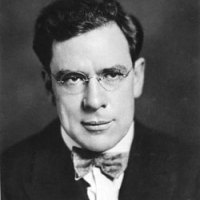Maxwell Andersen

(James) Maxwell Anderson (15 December 1888 - 28 February 1959) was a Pulitzer Prize-winning playwright, author, poet, reporter and lyricist, and a founding member of The Playwrights' Company (which included, at various times, Maxwell Anderson, S.N. Behrman, Elmer Rice, Robert E. Sherwood, Sidney Howard, Roger L. Stevens, John F. Wharton, and Kurt Weill), and produced many notable plays of the 20th century.
HIS LIFE:
He was born in Atlantic, Pennsylvania, the second child of William Lincoln Anders, a Baptist minister, and his wife, formerly Charlotte Perrimela Stephenson. His family initially lived on his maternal grandmother's farm in Atlantic, and then moved to Andover, Ohio, where his father became a railroad fireman while studying to become a minister. They moved to Jamestown, North Dakota in 1907, where Anderson attended Jamestown High School, graduating in 1908.
As an undergraduate, he waited tables and worked at the night copy desk of the Grand Forks Herald, and was active in the school's literary and dramatic societies. He obtained a B.A. in English Literature from the University of North Dakota in 1911. He became the principal of a high school in Minnewaukan, North Dakota, also teaching English there, but he was fired from this job in 1913 because he had made pacifist statements to his students. He then entered Stanford University, obtaining an M.A. in English Literature in 1914. He became a high school English teacher in San Francisco: after three years he became chairman of the English department at Whittier College in 1917. He was fired after a year for public statements supporting a student seeking conscientious objector status. He next became a reporter for the San Francisco Chronicle, and then moved to New York, where he wrote editorials for the New Republic, the Evening Globe, and the Morning World.
In 1921, he founded Measure, a magazine devoted to verse. He wrote his first play, White Desert, in 1923, which ran only twelve performances, but was well-reviewed by the book reviewer for the New York World, Laurence Stallings, who collaborated with him on his next play What Price Glory?, which was successfully produced in 1924 in New York City. Afterwards he resigned from the World, launching his career as a dramatist.
He wrote many well-known plays, of widely-varying styles, and was one of few modern playwrights to make extensive use of blank verse. Some of these became movies, and Anderson wrote screen adaptations of his own plays as well as those of other authors and books of poetry and essays. He was awarded the Pulitzer Prize in 1933 for his political drama Both Your Houses, and twice received the New York Drama Critics' Circle Award, for Winterset, and High Tor.
Anderson was, above all, a strong believer in the dignity of man (although humanism might be too strong a word), and many of his plays focus on the concepts of liberty and justice. Anderson can probably be credited with popularizing the use of poetry in modern drama. He chose to write in solitude, preferring to write longhand in a wire-bound notebook, and refused to attend the opening nights of his plays.
He married Margaret Haskett, a fellow classmate, on 1 August 1911 in Bottineau, North Dakota. They had three sons, Quentin, Alan, and Terence. Margaret died of cancer on 22 February 1931. Anderson then resided with Gertrude "Mab" Higger starting in about October 1933. A daughter, Hesper, was born 2 August 1934. Gertrude ("Mab") committed suicide on 21 March 1953. Her daughter Hesper (who was screenwriter for the movie Children of a Lesser God, wrote a book South Mountain Road: A Daughter's Journey of Discovery about her unearthing, only after the suicide, the fact that her parents had never married. Maxwell Anderson did marry once more, to Gilda Hazard, on 6 June 1954.
Honorary awards include the Gold Medal in Drama from the National Institute of Arts and Letters in 1954, an honorary Doctor of Literature degree from Columbia University in 1946, and an honorary Doctor of Humanities degree from the University of North Dakota in 1958.
Maxwell Anderson died in Stamford, Connecticut, on 28 February 1959, two days after suffering a stroke.
Amongst his many works, are lyrics for one of MTI Shows Berlin To Broadway With Kurt Weill.
PLAYS AND MUSICALS:
" White Desert - 1923
" What Price Glory?- 1924 - a war drama
" First Flight - 1925 - written with Laurence Stallings
" The Buccaneer - 1925
" Outside Looking In - 1925
" Saturday's Children - 1927
" Gods of the Lightning - 1929 (written with Harold Nickerson)
" Gypsy - 1928 - (not the later musical by Arthur Laurents, unrelated but for title)
" Elizabeth the Queen - 1930 - a historical drama in blank verse
" Night Over Taos - 1932
" Both Your Houses - 1933 -- Pulitzer Prize for Drama
" Mary of Scotland - 1933 - a historical drama in blank verse
" Valley Forge - 1934
" Winterset - 1935 - a verse tragedy inspired by the Sacco-Vanzetti case - First Annual New York Critics Circle Award
" The Masque of Kings - 1936
" The Wingless Victory - 1936
" High Tor - 1936 - New York Critics Circle Award
" Star-Wagon - 1937
" The Feast of Ortolans - 1937 - one-act play
" Knickerbocker Holiday - 1938 - book and lyrics
" Second Overture - 1938 - one-act play
" Key Largo - 1939
" Journey to Jerusalem - 1940
" Candle in the Wind - 1941
" The Miracle of the Danube - 1941 - one-act play
" The Eve of St. Mark - 1942
" Your Navy - 1942 - one-act play
" Storm Operation - 1944
" Letter to Jackie - 1944 - one-act play
" Truckline Café - 1946
" Joan of Lorraine - 1946
" Anne of the Thousand Days - 1947 - a historical drama in blank verse
" Lost in the Stars - 1949 - book and lyrics
" The Bad Seed - 1954
" Truckline Café - 1945
" Joan of Lorraine - 1946
" Anne of a Thousand Days - 1947
" Lost in the Stars - 1949
" Barefoot in Athens - 1951
" The Bad Seed - 1954
" High Tor - 1956 (TV score)
" The Day the Money Stopped - 1958 - (written with Brendan Gill)
" The Golden Six - 1958
FILMS:
" What Price Glory - 1926 - play
" Saturday's Children - 1929 - play
" Cock-Eyed World, The - 1929 - story
" All Quiet on the Western Front - 1930 - adaptation & dialogue
" The Guardsman - 1931 - play Elizabeth the Queen & one scene
" Rain - 1932 - adaptation
" Washington Merry-Go-Round - 1932 - play
" Death Takes a Holiday - 1934
" We Live Again - 1934
" The Lives of a Bengal Lancer - 1935 - uncredited contributing writer
" Maybe It's Love - 1935 - play Saturday's Children
" So Red the Rose - 1935
" Mary of Scotland - 1936 - play
" Winterset - 1936 - play
" The Private Lives of Elizabeth and Essex - 1939 - play 'Elizabeth the Queen
" Saturday's Children - 1940 - play
" Knickerbocker Holiday - 1944 - play
" The Eve of St. Mark - 1944 - play
" Winterset - 1945 - TV - play
" A la sombra del puente - 1946 - play
" Key Largo - 1948 - play
" Joan of Arc - 1948 - play Joan of Lorraine - screenplay
" Pulitzer Prize Playhouse - 1950 TV Series - play - four episoded
" Celanese Theatre - 1951 TV Series - play - two episodes
" What Price Glory - 1952 - play
" The Alcoa Hour - 1955 TV Series - play - episode "Key Largo"
" The Bad Seed - 1956 - play
" The Wrong Man - 1956 - novel The True Story of Christopher Emmanuel Balestrero
" Never Steal Anything Small - 1959 - play The Devil's Hornpipe
" Ben-Hur - 1959 - uncredited
" Barefoot in Athens - 1966 - TV - play
" The Star Wagon - 1967 - TV - play
" Elizabeth the Queen - 1968 - TV - play
" Anne of the Thousand Days - 1969 - play
" Valley Forge - 1974 - TV - play
" Lost in the Stars - 1974 - play
" The Bad Seed - 1985 - TV - play
" Meet Joe Black (1998) (earlier screenp





